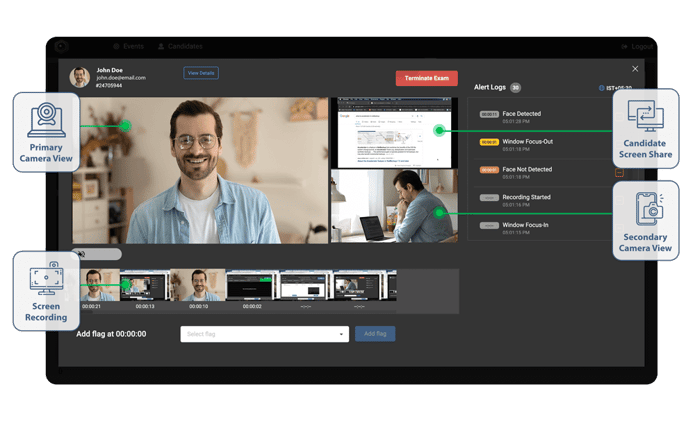In today's digital education landscape, ensuring academic integrity through online proctoring services is paramount. Crafting a well-defined Request for Proposal (RFP) is crucial to selecting the right proctoring solution for your institution. This comprehensive guide will walk you through each step of the process to create an effective RFP that meets your institution's needs and attracts the best-fit proctoring service provider.
Understanding Your Institution's Needs:
- Examination Types: Identify the various types of examinations conducted by your institution, including quizzes, midterms, and final exams.
- Essential Features: Determine essential features required in an online proctoring solution, such as live monitoring, AI-based behavior analysis, and secure exam environments.
Researching Potential Proctoring Service Providers:
Explore a range of online proctoring service providers in the market.Gather information on each provider's track record, client testimonials, and industry certifications.
Planning Your Online Proctoring RFP:
Before diving into the creation of your RFP, it's crucial to lay a solid foundation through meticulous planning. This stage encompasses several key components:- Project Description:
Begin by outlining the scope and objectives of your online proctoring project. Include details such as anticipated exam volume, the number of students expected to utilize the proctoring service, and the desired timeline for implementation. - Vendor Qualifications:
Establish clear vendor qualifications, including factors such as industry experience, relevant certifications, and compliance with data security standards. - Scoring Criteria:
Develop a comprehensive scoring criteria that will be used to evaluate vendor proposals. Assign weights to different sections of the RFP based on their importance to your institution's objectives. - Provide Dates and Times: which includes, RFP Issue Date, Submission Deadlines, Responses to Vendor Questions, Training & Implementation Time & Ideal Launch Date.
Creating an RFP Introduction:
It's your opportunity to clearly communicate the expectations and goals of implementing online proctoring software and outline the specific information you require in their responses.
Goals of Implementing Online Proctoring Software:Clearly articulate the goals you aim to achieve through this initiative, whether it's enhancing exam security, expanding access to remote assessment opportunities, or improving overall academic integrity.
Information Required in RFP Responses:In your RFP introduction, specify the essential information you expect from proctoring vendors. This includes:
- The number of online students and exams you plan to proctor.
- Whether the entire institution or specific departments will use online proctoring.
- The types of tests to be proctored, including traditional online tests, authentic assessments, and tests conducted in various settings (classroom or testing center).
- Details of relevant software and hardware currently in use, including learning management systems (LMS), third-party testing software, and device specifications.
Vendor Information:
This may cover aspects such as company background, key differentiators, recent achievements, and relevant customer references. Additionally, specify any specific contractual requirements or requests, such as providing a standard Master Services Agreement (MSA) or allowing for redlining.
Online Proctoring Features and Functionality Requirements:

Outline the specific features and functionalities you expect from the online proctoring solution.
- Automated proctoring: Utilize AI-driven algorithms to monitor and analyze student behavior.
- Secure ID verification: Ensure accurate student identification via methods like government-issued IDs, facial recognition, or multi-factor authentication.
- Screen recording and review: Capture student activity during exams for detailed review in case of misconduct or technical issues.
- Live proctoring options: Offer live proctor intervention for real-time support and to maintain exam integrity.
- Exam environment lockdown: Prevent access to unauthorized resources by restricting application switching, website access, or window minimization during exams.
LMS Integration:
Highlight the importance of seamless integration with your institution's learning management system (LMS). Specify requirements for LMS compatibility, including the integration process, compatibility with existing LMS features, and support for instructors and students within the LMS environment.
Accessibility:
Address the importance of accessibility considerations in the online proctoring solution. Specify requirements for compliance with accessibility standards, support for assistive technologies, accommodations for students with disabilities, and the availability of Voluntary Product Accessibility Templates (VPATs) for evaluation.
Data Security & Compliance:

Highlight the importance of security measures in online proctoring to maintain the integrity of examinations.
- What data is collected, and for what purposes?
- Who owns the collected data, and how is it managed?
- Does the vendor comply with relevant regulations, such as GDPR, PDPA, CCPA, COPPA, HIPAA, State and Local Privacy Laws.
- How is data collected, transmitted, and stored securely?
- What is the retention period for collected data, and how is it securely disposed of after this period?
- What protocols are in place for data encryption in transit and at rest?
- Is data classified based on sensitivity, and are appropriate access controls implemented?
Training & Support:
Outline your expectations for the level of support, implementation assistance, and training provided by the vendor. This encompasses:- Pre-sales support: Seek vendors readily available to answer your questions, address concerns, and provide in-depth information about their products or services during the initial exploration phase.
- Onboarding and implementation: Ensure the vendor offers a smooth onboarding process with comprehensive guidance and support to seamlessly integrate the online proctoring solution into your existing learning management system (LMS) and institutional workflows.
- Technical support: Expect ongoing technical assistance readily available to address any technical issues or queries that may arise after implementation.
- User training: The vendor should provide comprehensive training materials and resources for both administrators and students to ensure proficient use of the online proctoring solution.
Reviewing and finalizing the RFP:
Conduct internal reviews to ensure accuracy and completeness of the RFP document.
Seek input from key stakeholders, such as faculty members and IT professionals, to incorporate their perspectives. Make revisions as necessary before finalizing the RFP for distribution.
Explore Talview Proctoring:
Talview Proctoring stands out as a top choice, recently recognized as G2's Proctoring Leader a testament to its excellence in the field. Trusted by educational institutions worldwide, Talview Proctoring sets the standard for maintaining academic integrity in today's digital learning landscape.
Conclusion:
Crafting an RFP for online proctoring services is a meticulous process that requires careful consideration of your institution's needs and objectives. By following this comprehensive guide, you can create an RFP that effectively communicates your requirements and attracts the best-fit proctoring service provider. Remember to prioritize security, functionality, and support throughout the procurement process to ensure the successful implementation of an online proctoring solution.
Contact Talview today to include us in your RFP vendor list.


Leave a Reply